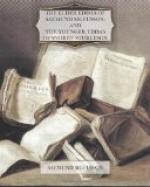[Footnote 99: The epithet aringreypr is applied both to benches and helmets (see Strophes 3 and 16). Its meaning is doubtful: it has been rendered iron-bound, brass-bound, hearth-encircling, curved like an eagle’s beak, etc. Benches and helmets of ceremony are evidently intended, probably ornamented with brass-work or figures of eagles. But to whichever substantive applied, I take its meaning to be the same.]
[Footnote 100: The messengers of Atli.]
[Footnote 101: The Giukungs.]
[Footnote 102: Gudrun: she had sent, by Atli’s messengers, a ring to her brothers, as a warning, in which a wolf’s hair was entwined, together with a note in runes, which were falsified by Vingi.]
[Footnote 103: Atli’s men.]
[Footnote 104: That is Gunnar himself.]
[Footnote 105: Spears.]
[Footnote 106: The horse.]
[Footnote 107: The original word is eyrskan, a word of doubtful signification.]
[Footnote 108: The serpent-pen.]
THE GROENLAND LAY OF ATLI.
1. Of those misdeeds men have heard tell, when warriors of old a compact made, which by pledges they confirmed, a secret consultation held: terrible it was to them after, and to Giuki’s sons likewise, who were betrayed.
2. The warriors’ fate ripened, they were death-doomed: ill advised was Atli, though he possessed sagacity: he felled a mighty column, strove hardly against himself; with speed he messengers despatched, that his wife’s brothers should come quickly.
3. Wise was the house-dame, prudently she thought; the words in order she had heard, that in secret they had said: the sage lady was at a loss: fain would she help them; they[109] o’er the sea must sail, but she herself could not go.
4. Runes she graved, Vingi them falsified, before he gave them from him; of ill he was the bearer. Then departed Atli’s messengers, through the branched firth, for where the bold warriors dwelt.
5. They with beer were cheered, and fires they kindled, naught thought they of guile, when they were come; they the gifts accepted, which the prince sent them, on a column hung them, and of no evil thought.
6. Then came Kostbera, she was Hogni’s wife, a woman greatly cautious, and them both greeted. Glad was also Glaumvor, Gunnar’s consort, the prudent dame her duty forgot not, she to the guests’ need attended.
7. Hogni they home invited, if he would be pleased to go. Treachery was manifest, had they but reflected! Gunnar then promised, if only Hogni would, but Hogni refused what the other proposed.
8. The noble dames bore mead, of many things there was abundance, many horns passed round, until it seemed they had full drunken.
9. The household prepared their couches, as to them seemed best. Cunning was Kostbera, she could runes interpret; she the letters read by the bright fire;—her tongue she had to guard between both her gums—so perverted were they, it was difficult to understand them.




